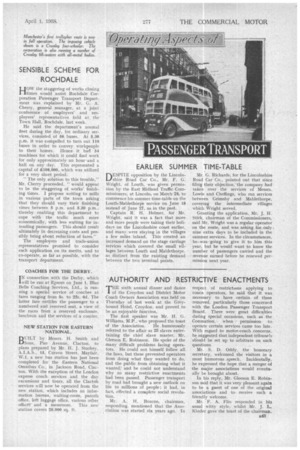AUTHORITY AND RESTRICTIVE ENACTMENTS
Page 57

If you've noticed an error in this article please click here to report it so we can fix it.
THE sixth annual dinner and dance of the Croydon and District Motor Coach Owners Association was held on Thursday of last week at the Greyhound Hotel, Croydon, and proved to be an enjoyable function.
The first speaker was Mr. H. G. Williams, M.P.. who proposed the toast of the Association. He humorously referred to the affair as 25 slaves entertaining the chief slave master, Mr. Gleeson E. Robinson. He spoke of the many difficult problems facing operators. He could not himself follow all the laws, but these prevented operators from doing what they wanted to do, and the public from obtaining what it wanted; and he could not understand why so many restrictive enactments had been passed. Passenger transport by road had brought a new outlook on life to millions of people ; it had, in fact, effected a complete social revolution.
Mr. A. H. Bourne, chairman, responding, mentioned that the Association was started six years ago. In respect of restrictions applying to coacn operators, he said that it was necessary to have certain of them removed, particularly those concerned with the London Passenger Transport Board. There were great difficulties during special, occasions, such as the Coronation, • when permission tooperate certain services came too late. With regard to motor-coach concerns, he suggested that independent tribunals sliould be set up to arbitrate on such questions.
Mr. S. D. Oddy, the honorary secretary, welcomed the visitors in a most humorous speech. Incidentally, he expressed the hope that a merger of the major associations would eventually be brought about.
In his reply, Mr. Gleeson E. Robinson said that it was very pleasant again to be a guest of one of the original associations and to receive such a friendly welcome.
Mr. F. A. Flin responded in his usual witty style, whilst Mr. J. Kinder gave the toast of the chairman.




























































































